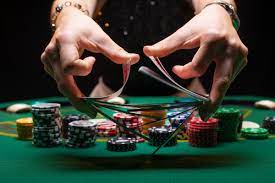Casinos have long been synonymous with excitement, fortune, and the UFAG7 of risk. From their dazzling lights to the cacophony of clinking coins and rolling dice, casinos create an atmosphere of energy and anticipation that has captivated millions worldwide. Whether perched on the Strip in Las Vegas or hidden in the rolling hills of Monaco, these establishments are designed to offer more than just a chance to win—they promise an experience, one that combines entertainment, luxury, and the rush of chance.
The Origins of the Casino: From Gambling Parlors to Iconic Destinations
The concept of gambling itself dates back thousands of years, with ancient civilizations using dice, animal bones, and other objects for games of chance. While various forms of gambling existed in cultures from Mesopotamia to China, the first modern casinos as we know them began to emerge in Europe in the 17th century. The term “casino” itself comes from the Italian word casa, meaning house, which initially referred to small houses or villas where people would gather for social events, including gambling.
The first official casino, the Casino di Venezia, opened in Venice in 1638, catering to the city’s upper class. It was an exclusive venue designed for leisure, where the wealthy could indulge in games of chance. The idea of a casino soon spread across Europe, and by the 19th century, venues in cities like Monte Carlo and Paris began to refine the concept, offering luxury, sophisticated decor, and a wide variety of games.
The modern casino, however, owes much of its current form to the American gambling industry, particularly in Las Vegas. Following the legalization of gambling in Nevada in the 1930s, Las Vegas became the epicenter of casino culture, with lavish hotels, high-stakes games, and world-class entertainment all converging in one electrifying locale.
The Psychology of Gambling: Why Do People Gamble?
At its core, gambling is about the thrill of risk and reward. But why do people, both casual players and seasoned gamblers, flock to casinos? The psychology behind gambling is complex, involving a mixture of chance, strategy, and human emotion.
The primary appeal of gambling lies in the excitement and unpredictability of the outcome. In a game like roulette or blackjack, players are always on edge, hoping for that one lucky roll or winning hand. The near-miss effect, when a player comes close to winning but doesn’t, can also create a heightened sense of anticipation, encouraging them to continue playing in the hopes of hitting a jackpot.
Casinos are designed to exploit these psychological factors. Lights, sounds, and the arrangement of the games are all carefully crafted to keep players engaged. The absence of clocks, the strategic placement of drinks and refreshments, and the open layout encourage guests to stay longer and immerse themselves in the experience, with the belief that their next spin or bet could bring a big win.
The Games: The Heartbeat of the Casino
Casinos are home to a wide array of games, each offering a different kind of thrill. The most iconic of these games include:
1. Slot Machines: The Ultimate Game of Luck
Slot machines are perhaps the most recognizable feature of any casino. With their flashing lights, vibrant graphics, and spinning reels, these machines draw millions of players each year. Slots are a game of pure chance, offering instant gratification with the potential for huge jackpots. From classic three-reel slots to complex video slots, these machines are a staple of the modern casino experience.
2. Table Games: Skill Meets Chance
Table games such as blackjack, roulette, poker, and baccarat offer a blend of strategy and luck. Blackjack, for example, requires a combination of mathematical skill and psychological insight into how the dealer plays. Roulette, on the other hand, is based entirely on chance, with players betting on where a ball will land on a spinning wheel.
Poker stands out as the game of choice for those who want to test their skill and bluffing abilities. From Texas Hold’em to Omaha, poker is played in casinos worldwide, and its competitive nature has made it a popular choice for professional players. High-stakes tournaments, like the World Series of Poker, have added a layer of prestige to this classic casino game.
3. Craps: The Dice Game
Craps is one of the most exciting and social games in a casino. Played with dice, the game is filled with energy as players cheer for lucky rolls. While the game can seem complicated to outsiders, craps is actually simple once you understand the basic bets. The drama of rolling the dice and the camaraderie shared with other players at the table make it a unique experience.




